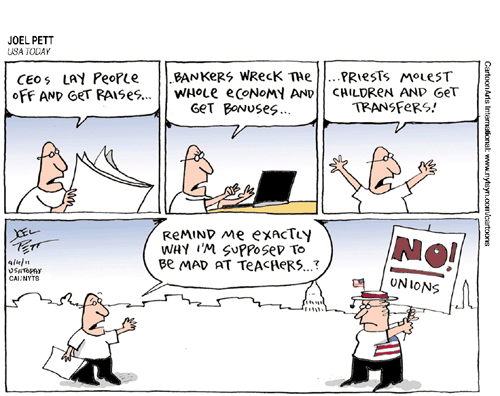“Punting the Pundits” is an Open Thread. It is a selection of editorials and opinions from around the news medium and the internet blogs. The intent is to provide a forum for your reactions and opinions, not just thttp://www.commondreams.org/view/2011/06/28-1o the opinions presented, but to what ever you find important.
Thanks to ek hornbeck, click on the link and you can access all the past “Punting the Pundits”.
Wednesday is Ladies’ Day. Scroll down for the Gentlemen.
Courtney E. Martin: For Undocumented Immigrants, Activism Can Invite a Deportation Threat
The contentious debate over immigration was given a human face last week when Pulitzer Prize-winning journalist Jose Antonio Vargas outed himself as an undocumented immigrant in a New York Times Magazine article. In a very personal essay, Vargas detailed his journey from boyhood in the Philippines to a prestigious journalism career in the United States. Vargas admitted to breaking a number of laws to conceal his citizenship status over more than a decade of working illegally for a range of high-profile publications, including the Washington Post, the Huffington Post and The New Yorker. The essay quickly rose to the top of the “Most e-mailed” list at the Times and landed Vargas, and his compelling story, on a major media sites over the weekend.
Vargas’s personal story is vital because it complicates the usual terms of the immigration debate: outsiders vs. insiders, deserving vs. undeserving, legal vs. illegal. After all, one can’t help but see Vargas, though undocumented, as the consummate deserving insider-an American Dream hero incarnate, transcending race and class boundaries to make a real impact through his reporting. It’s nearly impossible to see a picture of the goofy adolescent, who watched “Frasier” to better his English or hear the story of his choir teacher’s admiration for him, and think “criminal.”
Katrina vanden Heuvel: 29 Miners and Massey’s Coal Crimes
It was Easter Weekend 2010 when 33-year-old Gary Quarles-a skilled miner with 14 years experience and a father of two- and an “up and coming” miner, Nicolas McCroskey, 26, were having dinner with a friend. They said that “something bad was going to happen” at Massey Energy’s Upper Big Branch (UBB) mine where they worked.
That Sunday, Quarles also confided in a close friend he’d known since childhood.
“I’m just scared to go back to work,” he said. “Man, they got us up there mining and we ain’t got no air. You can’t see nothing. I’m just scared to death something bad is going to happen.”
The next day, a powerful explosion tore through two and one-half miles of the mine, killing Quarles, McCroskey, and 27 of their fellow miners. Men like Carl Acord, 52, who had worked the mines for 34 years and was a proud member of the “Old Man Crew”; Jason Adkins, 25, who had won all-state honors in football and basketball in high school; Cory Davis, 20, who had followed his family into the mines; US army veteran Steven Harrah, 40, devoted to his wife and six-year old son; Dean Jones, 50, leaving behind his wife and a son with cystic fibrosis; Roosevelt Lynch, 59, a miner for over 30 years and a substitute teacher, as well as a basketball, football, and track coach; Vietnam vet Benny Willingham, 61, a coal miner for 30 years who was five weeks away from retirement; and so many more.
Laura Flanders:
How Corporations Award Themselves Legal Immunity
Whether it’s in your employment contract or the paperwork for a cell phone, it’s odds on that the small print says you can’t sue
Worried about the influence of money in American politics, the huge cash payouts that the US supreme court waved through by its Citizens United decision – the decision that lifted most limits on election campaign spending? Corporations are having their way with American elections just as they’ve already had their way with our media.
But at least we have the courts, right?
Wrong. The third branch of government’s in trouble, too. In fact, access to justice – like access to elected office, let alone a pundit’s perch – is becoming a perk just for the rich and powerful.
Take the young woman now testifying in court in Texas. Jamie Leigh Jones claims she was drugged and gang-raped while working for military contractor KBR in Iraq (at the time, a division of Halliburton). Jones, now 26, was on her fourth day in post in Baghdad in 2005 when she says she was assaulted by seven contractors and held captive, under armed guard by two KBR police, in a shipping container.
Beverly Bell: Monsanto in Haiti
HINCHE, Haiti, June 27 – Last week, thousands of farmers and supporters of Haitian peasant agriculture marched for hours under the hot Caribbean sun to call for more government support for locally grown seeds and agriculture.
The demonstration was organized by the Peasant Movement of Papay and other farmer associations, human rights and women’s groups, and the Haitian Platform for Alternative Development (PAPDA), the Haitian online agency AlterPresse reported from the march. The official theme of the peaceful demonstration was “Land Grabbing is Endangering Agricultural Sovereignty.”
Singing slogans like “Long Live Haitian Agriculture!” and “Long live local seeds!” the crowd – wearing straw hats and red T-shirts – wound its way on foot, donkeys, and bikes through this dusty provincial capital. The demonstration ended at a square named for farmer Charlemagne Péralte, who lead the “Caco” peasant revolt against the U.S. army occupation from 1916 until 1919, when U.S. Marines assassinated him.
Kay Tillow: One Montana County’s Medicare-for-All Coverage
As the Ryan Republicans try to destroy Medicare, here’s a prescription to clean up the whole mess.
Back when he presided over the Senate’s health care reform debate, Max Baucus, chairman of the all-powerful Senate Finance Committee, had said everything was on the table – except for single-payer universal health care. When doctors, nurses, and others rose in his hearing to insist that single payer be included in the debate, the Montana Democrat had them arrested. As more stood up, Baucus could be heard on his open microphone saying, “We need more police.”
Yet when Baucus needed a solution to a catastrophic health disaster in Libby, Montana and surrounding Lincoln County, he turned to the nation’s single-payer healthcare system, Medicare, to solve the problem.
George Zornick: Debt Ceiling Theatrics Get More Dangerous by the Day
Republicans have been playing a double game with the debt limit debate. On one hand, it’s hard to imagine GOP members of Congress actually blocking a measure that would raise the debt ceiling, because that would lead to sudden, dramatic reductions in government functions: there might not be money for Social Security payments, Medicare checks, military salaries and more. Worse, confidence in US Treasury bills would be seriously wounded if the debt ceiling isn’t raised by August 2, meaning economic catastrophe. Voters would blame Republicans for this economic catastrophe, polls show, and House Speaker John Boehner was warned by Wall Street executives in no uncertain terms that he could not allow this situation to occur.
Ari Melber: Cuomo’s Big Problem in 2016: Democrats
After New York’s historic gay marriage vote last week, the national political media has begun speculating about the presidential prospects for New York Governor Andrew Cuomo. Right now, in fact, Cuomo is drawing more national media attention and more Google searches than at any other point in his governorship.
So reporters and regular people are zeroing in on Cuomo. But put aside the historical significance of the gay marriage vote, and anyone who follows New York politics knows the prospect of Cuomo as a popular Democratic primary candidate in 2016 is a joke.
Robert Dreyfuss: Memo to Obama: Talk to Syrian President Bashar al-Assad
The Obama administration ought to resist calls from neoconservatives and hawks, including the ever-hawkish Washington Post, and opt for dialogue with Bashar al-Assad, the president of Syria.
It’s a difficult problem, but the fact remains that there’s little or nothing that President Obama can do to force regime change in Syria. (In other countries, too, it’s not so easy. In Libya, three months of a US- and NATO-led war have failed to topple Muammar Qaddafi. In Bahrain, where the United States has lots more leverage and contacts, the royal family there is resisting change.)
On this day in 1997, Hong Kong returned to China.


 On this day in 1986, the
On this day in 1986, the 


 On this day in 1919,
On this day in 1919, 

Recent Comments